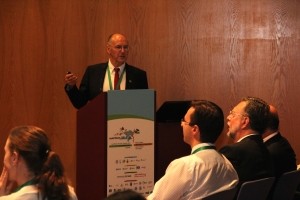Academic: "Anybody who thinks the world’s malnutrition problems are going to be solved without industry is dreaming."
Time for a vitamin E intake rethink? Emerging data builds argument

Vitamin E (alpha-tocopherol) researchers presented the emerging data at a DSM Nutritional Products-sponsored seminar that was put in policy context by the firm’s senior VP of nutrition science and advocacy, Dr Manfred Eggersdorfer, who highlighted issues with intakes as well as typical intake recommendations that often sit at around 15 mg/day.
Dual role
“A congress like this is a stimulus for organisations to reassess recommendations,” said Dr Eggersdorfer, who noted the dual role of the antioxidant as both an essential nutrient for bodily function and one that has potential to reduce the risk of ailments like heart disease, Alzheimer’s, liver disease and obesity when administered at higher doses.
“Doses of 400 mg, 800 mg, even up to 2000 mg might be helpful to reduce the risk or prevent disease in some cases and this is what the data is showing.”
Bridging the data gap
Firms like DSM, along with some health professionals and academics, not to mention some policy makers, have been frustrated by a lack of action over intakes even as surveys show vitamin E deficiency to be a widespread issue.
In the US, 90% of the population does not achieve the 15 mg/day recommendation, intake levels that are mimicked in much of the western world. In Europe recommended intakes vary between 4-25 mg for tocopherol vitamin E forms for men. For women it ranges between 3-12 mg a day.
But regulators have been reluctant to shift recommendations without stronger data linking deficiencies and adverse public health outcomes.
DSM and the vitamin E scientists who gathered at the 3rd World Congress of Public Health Nutrition in Gran Canaria this week are hoping the data presented can add weight to the argument to raise intake recommendations.
The garden of policy

One of the scientists, Dr Keith West, from the Johns Hopkins Bloomberg School of Public Health, told us after his presentation he expected policy makers to take note of some of the research advances. Dr West cited vitamin A as an example of such a success, especially in Asia and Africa where he conducts most of his research these days.
“It’s taken 20 years with vitamin A, but public health policy change takes a long time and I would expect to see policy move forward with vitamin E as well,” he said, adding, “Building the evidence for policy and getting the policy to change is one thing but policy is like a garden – you have to weed it all the time and so you have to keep bringing the data up all the time, adding data where it is available in order to keep the policies moving forward.”
“It’s moving forward with micronutrient supplementation during pregnancy which will replace folic acid/iron supplementation which is the norm for pregnancy in south Asia in the next five years.”
Overlapping interests
Dr West, who presented data linking raised vitamin E levels with reduced miscarriage rates in a Bangladeshi cohort, backed industry’s place at the nutrition science and policy table.
“I think private-public partnerships are important. They are different worlds. There is the academic domain, the industry domain. But they are not mutually exclusive – there is considerable overlap of interest.
“As long as there is a respect for the distance that does exist on some issues and you find your common ground that partnership is important. Anybody who thinks the world’s malnutrition problems are going to be solved without industry is dreaming. You have to work across the systems to find the best solutions.”
Dr Eggersdorfer said it was exactly that kind of cross-fertilisation of ideas and actions that drove it to engage events like the Gran Canaria congress.
“We are reaching out to different audiences and key stakeholders including scientists. Others are health insurance companies because they are interested in what can be done to prevent diseases from the point of view of nutrition. We are also engaging with medical doctors because they have the interaction with people with health issues.”
Other speakers at the seminar included Dr Maurice Dysken who relayed data about positive links between vitamin E and reduction in the onset and progression of Alzheimer’s.


















